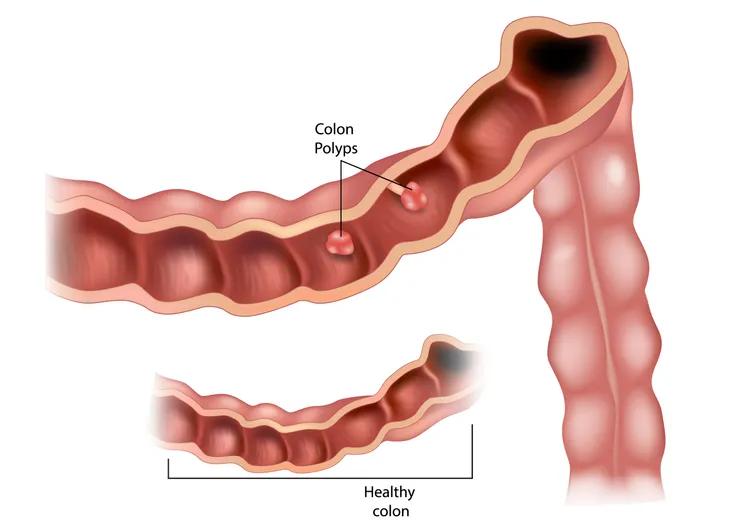According to the American Cancer Association, bowel cancer is among the five most common cancers among men and women in the U.S. Fortunately, over 90-percent of cases identified can be treated with success as long as they are diagnosed early.
Bowel cancer refers to cancers that develop in the colon or the rectum. Depending on where the cancer originates, bowel cancer may specifically be referred to as either colon cancer (striking the large bowel) or colorectal cancer (affecting the colon’s back passage). While regular screening tests are vital for early detection, these 6 early warning symptoms—such as blood in stool, abdominal pain, and changes in bowel habits—can indicate there is an issue. To reduce your personal risk of bowel cancer, look for the following symptoms in one or more combinations..
1. No Symptoms
According to the Colorectal Cancer Association of Canada, the symptoms of bowel cancer can be very subtle and don’t necessarily indicate a health issue. For instance, patients may blame abdominal discomfort on something they ate or stress.
Even those patients who are careful about monitoring and maintaining their health admit that they overlooked recurring yet subtle discomforts that they shrugged off as totally normal. If you experience changes in your health and bodily functions, even if they’re embarrassing, talk to your doctor about cancer health screenings.
2. Painful Bloating
While you may pop an antacid and blame chronic bloating, or gas, on a rich meal—be sure to note when stomach upset takes place. According to Cancer Research UK, abdominal discomfort and bloating should be monitored.
For instance, research from the World Cancer Research Fund indicates that diets rich in red meat and processed meats can increase the risk of bowel cancer. If you have a family history of bowel cancer, or your doctor deems you at risk, cut your intake of red meats (i.e., beef, lamb, veal, and pork) as well as processed meats (i.e., lunch meats like salami and ham, bacon, sausages and canned meats).
3. Abdominal Pain
In addition to uncomfortable gas and bloating, an early indication of bowel cancer may be abdominal pain or cramping. Chronic stomach pain is also a common symptom of bowel cancer when combined with changes in a patient’s regular bowel habits (i.e., the presence of blood in stool).
According to research from the Canadian Cancer Society, abdominal pain can occur in many types of medical conditions. Keep an eye out for abdominal discomfort that causes sharp pain, chronic cramps, gas, an uncomfortable feeling of fullness or bloating, and any lumps that can be felt when pressing on the abdomen.
4. Blood in Stool
Sure, blood in your stools can occur with hemorrhoids, where related pain, tenderness, and the presence of a lump hanging from your rectum can be present and visible with a mirror. However, according to the Cleveland Clinic, blood present in the stool is the most telltale sign of colorectal cancer. If you notice blood in your stool, talk to your doctor immediately.
Keep in mind that even though other health issues can result in bloody stool (i.e., anal tears, ulcerative colitis, Crohn’s disease, bleeding in the digestive tract, and hemorrhoids), book an appointment to speak with your doctor as soon as possible. This will help diagnose your issue directly and start the proper treatment necessary to treat your condition.
5. Changes in Bowel Habits
Patients are not often willing to talk to a loved one or their doctor about changes in their bowel habits. However, a variety of bowel-related occurrences can indicate an issue with bowel health, and even indicate the presence of cancer.
The American Cancer Society points to several bowel-changing symptoms that could indicate bowel cancer. You know what’s normal for your body. Sudden changes in normal bowel routine, for instance, loose or narrow stools, blood in stool, discolored stool (i.e., tar-like or mucus), the frequent need to go to the bathroom, a full feeling in the bowel even though you’ve recently gone to the washroom, or chronic constipation may all indicate a partial blockage of the large intestine.
6. Bowel Polyps
The Mayo Clinic indicates that most instances of colon cancer begin as benign growths, or polyps, that attach to the wall of the bowel. Polyps often start as small spots that don’t cause any adverse symptoms. However, while most polyps remain benign, the presence of an adenoma polyp can lead to malignant cancer.
Adenoma cancer cells that remain undetected for some time will eventually develop into a tumor growth on the colon wall or inside the rectum. Further undetected growth can result in cancer cells traveling into the lymph nodes or bloodstream as it spreads (or metastasizes) to other areas of the body (i.e., lungs or liver).









